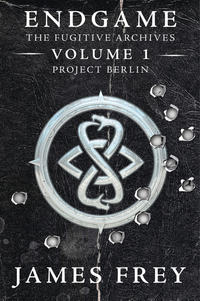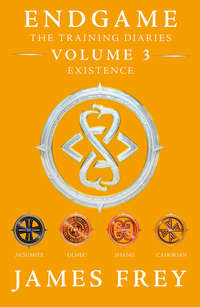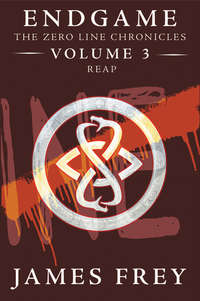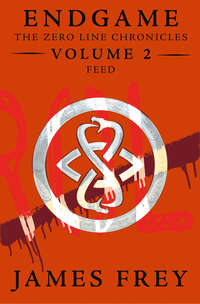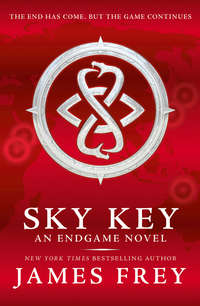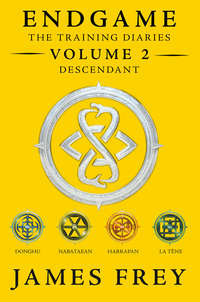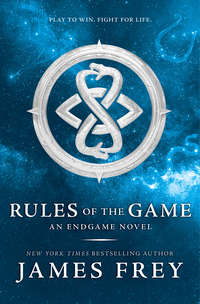
Полная версия
Existence
But for now, she leaves—and leaves him alone with his parents.
“No,” his mother says, reclining into her favorite leather armchair. “I don’t like this one.” This house is several generations old, but when his parents got married, his mother redecorated it from floor to ceiling. She chose furnishings and tapestries that would look ancient, as if they’d always been there—as if this were her ancestral home. The bloodred eagle claw that serves as a family crest is emblazoned on the archway over the door, and etched into each of the stone tiles beneath her feet. This estate is her domain, now. She may have married into the family, but sometimes Jago thinks his mother is more of a Tlaloc than any of them.
“I like her, Mamá. That seems somewhat more relevant.”
His father, as usual, remains silent on questions of love.
“She’s going to put ideas in your head,” his mother says.
“How do you know I’m not going to put ideas in her head?”
“Oh, Jago.” His mother leans forward and clasps his hands. “You think you’re such a strong man, but you’re still a soft boy. You’re weak, here.” She taps his chest. “You always have been.”
“What are you worried about, Mamá? That I’ll be happy?”
“This is a girl who doesn’t understand anything about your life or your responsibilities, Jago. If it were simply a distraction, if you were merely slacking off …” She stops him before he can object. “Yes, I know all about the training you’ve missed, and I don’t care. Boys will be boys, and all that. I want you to have your fun, Jago. But you can’t go thinking it’s anything more. This girl, she doesn’t fit into your life—not now, not ever. And you can’t afford to start thinking that the two of you are the same. What you do … you can’t just quit because you get bored.”
“Don’t you think I know that?” he snaps.
He’s thought about it plenty, what it would take to walk away, how much he would have to want it and how much he would be giving up.
“Watch your tone, Jago.”
“Alicia isn’t just some girl, Mother. She’s not a distraction, but she’s also not a bad influence. She’s … Alicia. She’s amazing. And you would see that, if you weren’t so judgmental.”
He’s the only person who dares talk to her this way, and often she likes it. Not tonight.
“I could forbid you from seeing her,” his mother muses, as if weighing the idea.
“Don’t do that,” he warns her. “Don’t make me choose.”
Her eyebrows shoot sky-high. “Oh?”
He can’t look at her.
“I see,” she says. “Then I suppose I’ll simply have to live with it, won’t I?”
She stands up with great dignity, turns her back on him, and strides out of the room. He’s won, he thinks. But he doesn’t feel that way. Maybe because she’s right about one thing. Alicia has put ideas in his head, made him wonder whether violence and duty are his destiny, or only one choice among many.
He could be the Player without being a criminal, he thinks. He could choose a different life without renouncing his obligations. Isn’t that possible? He could walk away from the family business, be a poet or a musician or some anonymous man selling fried meat in an alleyway … couldn’t he? The Tlaloc family’s rule over Puno has been inextricably linked with Endgame and the Players for as long as any of the Olmec can remember, but just because something once was, must it always be?
He could even walk away from Endgame altogether, renounce his status as the Player, hand the sacred duty over to someone else. He could be free of all the training, of having the fate of his line rest on every choice he makes.
Jago remembers the first time he truly felt like the Player. He was 13 years old, just months past swearing the oath, binding himself to this life and this duty. He had been on training missions before, of course, but this one was different. This wasn’t simply some exercise put to him by his uncles, an attempt to hone his skills. This was real. Meaningful.
He had scaled a skyscraper in Buenos Aires, disabled an alarm system, slipped past a security force armed with machine guns, cracked a safe owned by the richest man in Argentina, and taken an ancient Olmec knife that this man’s ancestors had stolen from Jago’s people long ago.
There have been so many missions since then that Jago barely remembers this one. He left some bodies behind, he remembers that. There was a bit of a mess on the way out—an alarm, an explosion, a hasty escape down the Rio de la Plata—but mostly, it’s a blur.
What he has never forgotten, what he will never forget, is how it felt to arrive home with the ceremonial knife in hand. How his uncle, a former Player himself, kissed his forehead, and said, “You have done well for your people.”
Jago had won victories for his family before; he had been fighting for Tlaloc honor in the streets since he was six years old. But this was different. This wasn’t for the Tlalocs; this was for the Olmec. This was noble; this was right.
That day, Jago didn’t feel like the monster of Juliaca, the ugly, scarred Feo who takes whatever he wants, whose face makes his people cower in fear.
Jago felt like a hero.
He could never give that up. Without Endgame, he’s nothing. He’s nobody.
But maybe he wouldn’t have to give it up. Maybe he could have Alicia, and the beautiful life she wants for both of them, and still be a hero.
Even thinking this way, even imagining, is a betrayal. That’s how his mother would see it, at least, and she would never let him speak to Alicia again. His mother loves him; he knows that. But her love is the opposite of Alicia’s: It comes with conditions. It comes with expectations. She loves her son, who is the heir to the family business, who is the Player, who is strong and ruthless and powerful. She couldn’t fathom the idea of a son who was none of those things, who was simply Jago, her boy. For his mother, love and power are inextricable. If he ever gave up the one, he would lose the other. He knows that.
But it doesn’t matter, he reminds himself. These are just idle thoughts, not acts, and thoughts are safe. No one can peer inside his head.
His mother will never have to know.
But thoughts do have consequences.
Even the act of thinking can have consequences.
This is one of the first lessons Jago learned as a child, as he mastered rudimentary hand-to-hand combat. Instinct is always faster than conscious thought, and in a combat situation almost always more accurate. When thinking drowns out instinct, when it makes you second-guess yourself or hesitate to do what must be done, that’s when it can be most deadly.
Jago should have known that; he should have known better.
But on that Friday afternoon, one week before Alicia is due to leave him behind, as he tracks his prey to a flophouse on the edge of the city and corners them in a seedy room rented by the hour, he’s not thinking about his childhood lessons.
He’s thinking about what Alicia said to him that morning: “Let’s run away together, just the two of us. Let’s see the world.”
Does she mean it?
Would she do it?
Would he?
He’s been tasked with hunting down two men, former employees foolish enough to steal from the Tlalocs and think they could get away with it. This is a crime that comes with a standard punishment: death.
He doesn’t want to be here, in this dark, crumbling motel with its fetid stink and suspicious stains. He doesn’t want to be creeping through a rat-infested hallway, locking the silencer onto his gun, preparing to assassinate two men who have stolen from a family so wealthy it barely noticed the loss—two men whose greatest crime is stupidity. Tiempo and Chango wanted to come along, but Jago insisted on going alone.
It’s one against two, maybe. But the one is a Player.
The two don’t know it yet, but they’re doomed.
Jago creeps up to the door. The manager, after a small bribe made its way into his pocket, gave him the room number and a tip: the lock is broken. There’s nothing standing in Jago’s way.
You think this ugly life is all you can have, but you’re wrong, he can almost hear Alicia saying as he eases open the door.
One of the men, Julio, is sprawled on the bed facedown, snoring. Alejandro is shaving, with his back to the door. Two bullets, one in each head, easy in, easy out—that’s what he’s been trained to do.
What you’ve done doesn’t have to define you. What your parents want doesn’t have to define you. She’s said it so many times. She wants so much for him.
Jago takes aim. Alejandro first, because at the sound of the shot it will take Julio a second to shake off sleep and get his bearings, and by the time he does, he’ll be dead.
I don’t care what you’ve done in the past. Who are you now? Who do you want to be?
His finger tightens on the trigger, as it has many times before. This is a simple calculation; these men are enemies of the family, of the line.
You can choose.
For the first time in his life, Jago hesitates.
Then fires.
Alejandro screams as the bullet blows off his ear. Jago has perfect aim. He knows how to kill—or how to wound. As Julio leaps out of bed, Jago pulls the trigger again, firing a second shot through Alejandro’s other ear, another through his hand, a third and fourth through each of his feet. A final shot to his gut, an inch above the intestines. By the time Julio has reached his weapon, Alejandro is writhing on the floor, screaming and bleeding, and Jago’s gun is aimed at Julio’s forehead.
Julio drops his weapon, raises his hands in the air.
“Take your friend, leave this city, and never return,” Jago says. “And tell everyone that the punishment for crossing the Tlalocs is swift and painful.”
Julio nods quickly, repeatedly, murmuring, “Sí, sí, whatever you say, Feo, anything, please,” and—with Jago’s permission—kneels at Alejandro’s side, trying his best to staunch the bleeding.
Jago wonders whether Julio will get the wounded man help, or simply abandon him. If the latter, it will be a very painful death. But it will not be on Jago’s shoulders.
This is what mercy looks like, he thinks, backing away from the men and out the door, down the hall, home to Alicia’s embrace. This is what mercy feels like.
He won’t tell Alicia.
It’s not good enough for her.
Not yet.
On the day everything changes, Alicia’s last day in the country, Jago thinks he has never been so miserable and so happy at the same time.
They have driven to the eastern beach to watch the sun set over Lake Titicaca. “Nice metaphor for our relationship,” Alicia says, with something adjacent to bitterness. She still wants him to run away with her. He says, day after day, he can’t … he might … he shouldn’t … he doesn’t know … he needs more time.
They’re running out of time.
She could go back home; they could email and text and do whatever it is normal teenagers do when an ocean gets in between them, but nothing about them is normal, and Jago fears that once she leaves, he’ll never see her again. She’ll run away without him—or she’ll go home, return to the dance studio and the life her parents want for her, forget she ever flirted with being a different kind of girl. They have this one last day together, and then either he leaves behind everything he’s ever known and loved, betrays his duty and generations upon generations of Tlaloc Players, shames his family, breaks his sacred oath, gives up all the certainties of his life and steps into the unknown—or he loses the only girl he’s ever loved, and all hope of a beautiful life.
Leaving is impossible. But so is the thought of losing her.
She hopes against hope he’ll change his mind and go with her; he hopes against hope she’ll decide to stay.
In the meantime, they try not to think of the future; he holds her hand, and, quietly, they watch the sun sink in the sky. Waves lap at the shore. The sky is streaked with gold. Clouds glow an angry pink. “It’s like fire,” Alicia murmurs. “Like the sky is on fire.”
Jago looks beyond her, to the east, where the sky is a flat, peaceful blue, cool and calm. This is what loving Alicia feels like: firestorm and tranquillity, all at once. He feels wild when he’s with her, his skin sparking, his brain spinning, his heart leaping with possibility—but at his center is something so quiet and sure. A peace he’s never known without her, and fears he will never know again.
They’re both looking at the sky, not at the waves, not at the sand, not at each other, and certainly not at the empty road that winds along the strip of beach. Not even when an engine roars in the distance and a car approaches do they turn; Jago is determined that this moment be perfect, that for once they be alone in their pocket universe, no obligations to anyone but each other. His heart is beating so loud it drowns out his instincts.
And so he doesn’t see the car slow, the window roll down, the tip of a Kalashnikov poke through. He doesn’t, until it’s too late, see Julio’s face at the wheel, the face of the man he spared.
When he does see it, he throws himself at Alicia, but even the speed of the Player is no match for a bullet, and the bullet has already been fired, and Alicia is already screaming, already falling; Alicia is in his arms, bleeding and pale and fading away.
Julio guns the engine and speeds off.
This is what mercy looks like.
This is what mercy looks like: a pool of blood, seeping into sand. Pale skin, limp body, tearstained cheeks. A balled-up T-shirt pressed to the wound, bleeding through.
“Please,” Jago says, and he’s talking to the man on the other end of the phone, a man who works for his family, who fixes problems, whatever they may be—and he’s talking to Alicia, who won’t stop bleeding.
Jago knows first aid, he knows how to dress a wound, how to triage, how to think clearly in a crisis—and also knows how little he can do, alone on this strip of sand. Maybe he should put her in the car, drive to a hospital himself, but the car is nearly a mile walk down the beach, and he doesn’t want to move her unless he has to. Help will come, he tells himself. Help will come in time.
He lays her on her back, lets her weight seal the makeshift bandage to the wound, holds her hand, hopes.
“Jago,” she whispers. “I can’t.”
“Tough luck,” he says. “You have to. Hang on. Someone’s coming.”
“No, I can’t …” She draws in a rasping breath.
“You don’t have to talk,” he says. For her, he tries to keep his voice steady, fearless. He is Jago Tlaloc—he’s supposed to be immune to fear.
She coughs blood. He wipes it away, gently as he can. Her skin is hot to the touch.
“Who were they?” she asks him. “Why did they?”
“I don’t know,” he lies again.
But she’s always able to see through his bullshit. Even now. “It’s because of you,” she says. There’s more strength in her voice now. There’s fire. “This is because of you.”
“It doesn’t matter,” he assures her, and that’s the worst lie of all, because what could matter more?
“Someone shot me,” she says in wonder. “I got shot. What the hell?”
She’s laughing, suddenly, and he worries that this is delirium, that this is the beginning of the end, and the road is still empty; help is nowhere in sight.
“I’ll kill him for you,” Jago promises. “I’ll track him down, I’ll take him apart, piece by piece. I’ll make him hurt.”
“Oh God,” she gasps. “You.”
“What?”
“You … are just like them. Fucking monsters.”
He thought it couldn’t hurt any more than it already does. But this is worse. “No, Alicia—”
“You kill him, and then what? His family kills you? Is that where it stops? Does it ever stop? Or does it just keep going, pain and blood and blood and pain and pain and pain …”
She’s so pale. Her voice is thin and thready, the words floating away from her, like they belong to someone else. He tells himself that she’s feverish, in shock, that she doesn’t mean what she’s saying, that it doesn’t matter what she says, as long as she’s all right.
“Shhh. I know it hurts,” he whispers. “I know.”
“But it doesn’t.” She looks at him in childlike wonder, then coughs up another soft spray of blood. “It doesn’t hurt, Jago. I can’t … I can’t feel it. My legs. I can’t feel anything. …”
He stops breathing.
“Jago?”
Steady, he reminds himself. Calm. “That’s normal,” he lies. “Don’t worry.” He brushes her hair back from her sweaty face.
“Normal? This is normal?” She’s laughing again, laughing and crying and shaking, shuddering, her hand squeezing his as if of its own accord, all of her trembling. Except her legs—those are still. “What if I can’t dance again? What if I can’t … No. No. You. Get away from me.”
“I’m not going anywhere, Alicia.”
“You destroy everything. You make everything ugly, like you. I wish I never—”
“Don’t say that, Alicia.” She’s always seen the truth in him, the possibility. If all she sees is a monster … “Please.” If he were the monster she says he is, wouldn’t her words anger him? Wouldn’t he push her aside, tell her that she entered freely into this life, fooled herself into believing it couldn’t touch her, fooled him into believing that he had a choice?
He isn’t angry; he doesn’t push her aside. He wants to hold on to her forever, if she will only let him. “Please, Alicia, tell me you know I love you. That I will never let anyone hurt you again. That I can fix this. Please.”
She doesn’t say it.
She doesn’t say anything.
“Alicia?”
Her eyes are closed. Her face is as gray as the sunless sky. Sirens blare in the distance, so slow, so useless. Jago holds on to her, willing her to wake up, even if she wants to call him a monster, yell at him to let go. He never will.
She survives.
He knows this because he bribes a doctor to tell him.
She’ll recover; she’ll walk. It’s a medical miracle, the doctor says, and nothing more than that.
No one wants to tell him anything, not officially, because he’s not family.
And she won’t tell him herself, because when she wakes up, she refuses to see him. He could insist, of course. No one, certainly not the doctors working in the hospital’s brand-new state-of-the-art Tlaloc Memorial Wing, would dare tell Jago Tlaloc where he can and cannot go.
But he won’t violate her wishes, and she wishes to never see him again.
That’s what the kind nurse says, after he’s spent three days in a row in the waiting room, hoping she’ll change her mind.
“Go home,” the nurse suggests. “Get some rest. Get a hug from your mama. The girl will come around.”
Jago does go home; Alicia doesn’t come around.
Instead, she sends a letter.
Dear Feo, she writes, and that’s when he knows what kind of letter this will be. He’s Feo to her now. An ugly beast, and this is no fairy tale. There will be no third-act transformation. He is the monster, and she’s lucky to have escaped with her life.
The doctors say I’ll make a full recovery. Please don’t blame yourself. This isn’t your fault; it’s mine. You are who you are; your life is what it is. I never should have tried to turn you into someone else. I never should have let you believe this was anything more than a vacation for me—I guess I let myself believe it too. But when this happened … I know what I want now. Who I am. I’ve given my entire life to dancing, and I’m not going to turn my back on that. It’s my dream. My destiny, I guess you’d say. It took almost losing it to figure that out. I went a little crazy for a while, thinking it was so easy to just wish yourself into a different life. I’m going home, Feo. Thank you for helping me understand that I belong there. Just like you belong here. I’m sorry for ever suggesting otherwise.
Best wishes,
Alicia
Jago doesn’t understand. Has he done this to her? Broken her, convinced her to give up her dreams?
He’s the one who put her in harm’s way, by failing to live up to his responsibilities. If he’d only done his job, killed Alejandro and Julio, not fallen prey to this stupid delusion of kindness and mercy, then Alicia would have been safe.
His job, his entire life, is to protect his people. Maybe this is his punishment for imagining he could escape that, or want to.
Or maybe she means it, and this was, as she said, simply a vacation for her, a break from her cozy life.
Either way, this was inevitable. His mother was right: They’re too different. They’re too dangerous for each other. Alicia made him soft … and the consequences of that have made her heartbreakingly hard.
You are who you are, she wrote.
Best wishes, she wrote.
He doesn’t know which one hurts more.
Jago locks himself in his room for two days and two nights. He gives himself over completely to his anguish, letting it sweep over him, wash him out to sea; he drowns in it, drowns in memories of her. Jago has been taught how to withstand pain, how to retreat to a place in his mind where he doesn’t feel it, but he lets himself feel all of this: pain, guilt, betrayal, fury. He lets the fire rage inside of him, lets it burn everything away—and then, when he’s hollow and clean, burn itself out.
When he’s ready, when it’s done, he sets fire to the letter, drops it into the trash bin, and watches the flames consume what’s left of her.
He emerges from his room a different man.
A man who’s learned his lesson. Not to dream, not to wonder, not to love. Not to think he deserves anything more than what he has—not to think he’s anything but a monster. Feo, outside and in.
This is good. This is as it should be.
He will not forget himself again. He will not be tempted by mercy or beauty. He will not show weakness. He will find Julio, and punish him, as he will punish all enemies of the Tlaloc and the Olmec. But he won’t do it for Alicia, who ran away from him. He vows he will never again put some girl, some stranger from a foreign line, ahead of his own friends and family. He will never stop loving her; he will never forget her. But she is his past, and his past doesn’t have to define him. She taught him that.
A new future starts today. And from today on, he will act only for his line. He will care only for his own. They’re the only ones who can understand what he is, and love it.
They’re the only ones he can trust.
Hayu Marca Tlaloc steps out of the SUV and ventures into the abandoned alley, her high heels clicking against the cobblestones. She looks down in disgust, carefully stepping over a pile of drying dog shit. She’ll have to throw the shoes out when she gets home.
A small sacrifice to the cause.
At her side, she carries a small briefcase, filled with US$100,000.
Julio’s eyes light up when he sees it.
“You did a good job,” she tells him.
He bows his head. “Gracias, Señora Tlaloc.”
“But I’m surprised you’re not halfway to Brazil by now—my son’s sure to come looking for you, and I promise, he’s not very happy.”
He doesn’t dare meet her eyes. “I came for my payment.”
“Ah, yes. Your payment. Well worth it, I have to say.”
Her plan has worked out better than she could have imagined. Poor Jago will be heartbroken for a bit, she knows, but he’ll get over it. Every man needs a few dents in his heart—it’s how he learns to be hard. He’ll blame himself, of course, but he’ll forgive himself too. Men always do. It will be easier for him, believing that the girl made a full recovery, and Hayu has paid the doctors and nursing staff enough to ensure no one will ever say anything different.
As long as he never sees la gringa again, all will be well.


